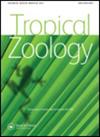Habitat modification and alpha-beta diversity in trap nesting bees and wasps (Hymenoptera: Aculeata) in southern Brazil
IF 0.7
4区 生物学
Q4 ZOOLOGY
引用次数: 10
Abstract
The global decline in biodiversity has been mainly attributed to the expansion of agricultural areas that transform continuous forest ecosystems into mosaic landscapes of simple agricultural and natural forest fragments. Considering this, the objective of this research was to evaluate if habitat modification affects trap nesting bees and wasps richness and abundance. An assemblage of bees and wasps that nest in pre-existing cavities was studied. The tested hypothesis was that species composition, richness and evenness are affected with habitat modification. Trap nests with different diameters were used to capture these insects in forests and in organic fields in Southern Brazil. Species composition in these areas was different, which led to the acceptance of the hypothesis that it is affected with habitat modification. The opposite occurred with alpha diversity because there was no significant difference between the richness of these areas. The most abundant genus, both in the forest areas and in the growing areas, was Trypoxylon, suggesting that the degree of impact on the Araucaria forest fragments is one of the factors that makes the diversity of these areas similar (in addition to the organic fields) since wasps of this genus usually occur in impacted areas.巴西南部捕巢蜂和胡蜂(膜翅目:针叶蜂)的生境改造和α - β多样性
全球生物多样性的下降主要归因于农业面积的扩大,将连续的森林生态系统转变为简单的农业和天然森林碎片的马赛克景观。考虑到这一点,本研究的目的是评估栖息地的改变是否会影响陷阱筑巢蜜蜂和黄蜂的丰富度和丰度。研究了在预先存在的洞穴中筑巢的蜜蜂和黄蜂的组合。经过检验的假设是,物种组成、丰富度和均匀度受栖息地改变的影响。在巴西南部的森林和有机地里,人们用不同直径的陷阱巢捕捉这些昆虫。这些地区的物种组成不同,这导致人们接受了受栖息地改变影响的假设。阿尔法多样性的情况正好相反,因为这些地区的丰富度之间没有显著差异。在森林地区和生长区,数量最多的属是锥虫,这表明对南洋杉森林碎片的影响程度是使这些地区的多样性相似的因素之一(除了有机地),因为该属的黄蜂通常发生在受影响的地区。
本文章由计算机程序翻译,如有差异,请以英文原文为准。
求助全文
约1分钟内获得全文
求助全文
来源期刊

Tropical Zoology
生物-动物学
CiteScore
2.50
自引率
0.00%
发文量
1
审稿时长
>12 weeks
期刊介绍:
Tropical Zoology is an international zoological journal publishing original papers in the field of systematics, biogeography, phylogeny, ecology and conservation of all terrestrial and aquatic animal Phyla from tropical and subtropical areas.
Only papers with new information, high quality and broad interest are considered. Single species description and checklists are not normally accepted. Review papers are welcome. The journal is owned by the Istituto di Ricerca sugli Ecosistemi Terrestri of the Consiglio Nazionale delle Ricerche, Florence, Italy (CNR-IRET) who performs research into the structure and functioning of aquatic and terrestrial ecosystems, focusing in particular on anthropogenic pressure and global change. The knowledge amassed forms the scientific basis for identifying the most appropriate protective and corrective interventions, and provides support for the bodies entrusted with formulating policies for environmental protection and recovery.
 求助内容:
求助内容: 应助结果提醒方式:
应助结果提醒方式:


